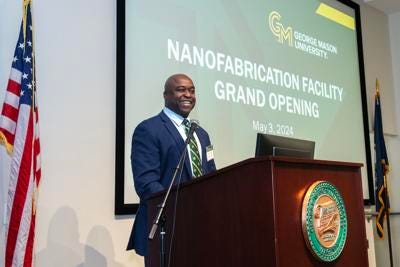The 'Grand Challenge': George Mason prepares for a future with less federal funding
By James Jarvis

This article was republished with permission from FXBG Advance’s news partner InsideNoVa.com. Sign up for InsideNoVa.com’s free email subscription today.
Before the 2024 election was decided, George Mason University was already preparing for the political fallout.
As candidates campaigned on slashing federal funding for “woke” institutions, university leadership braced for what President Gregory Washington warned would be a shifting research landscape. His message to campus: federal research dollars may decline—prepare accordingly.
That preparation took shape last fall as the Grand Challenge Initiative, a five-year, $15 million plan to realign the university’s research priorities around pressing societal problems. Now, as the Trump administration resumes scrutiny of diversity programs and freezes grants to elite universities, Mason’s early pivot appears prophetic.
Last week, the U.S. Department of Education’s Office for Civil Rights opened a Title VI investigation into the university over allegations that its hiring and promotion practices discriminate on the basis of race. The complaint, filed by George Mason professors, claims the school gives unlawful preference to candidates from underrepresented groups and violates civil rights law. If substantiated, Mason could join a growing list of schools at risk of losing federal funding.
Despite the scrutiny, Andre Marshall, George Mason’s vice president for research, innovation, and economic impact, said the university isn’t panicking.
“We already had a plan,” he told Inside NoVa.
What is the Grand Challenge, and how it will work
The Grand Challenge Initiative was developed through a task force of more than 20 faculty, staff and administrators. Rather than dictating specific topics, the initiative lays out six “grand solutions” that reflect the university’s strengths and values.
Out of more than 80 initial ideas, the group settled on six “grand solutions” that now anchor the initiative:
Advancing 21st-century education for all
Building a climate-resilient society
Driving responsible digital innovation and sustainable infrastructure
Improving health, well-being and preparedness
Pioneering space exploration, research and collaboration
Strengthening peace, trust and engagement in democracy
“Many universities have grand challenge initiatives, and we have one grand challenge, which is to create the future we want, and not the one that we will be forced to endure,” Marshall said.
The university will issue its first request for proposals this fall. A faculty-led investment committee will evaluate submissions based on their relevance to the six solutions, potential real-world impact and ability to attract partners or funding.
The $15 million investment, drawn from university funds, will be spread across three categories: talent recruitment, programs and projects, and infrastructure. University officials hope the initiative will also leverage additional support from federal agencies, foundations and industry.
One early example is George Mason’s Innovation District at the university’s SciTech campus in Prince William County. The district recently received $2.6 million through the Commonwealth’s Growth and Opportunity for Virginia, or GO Virginia, initiative to help position Northern Virginia as a national hub for sectors like life sciences, cybersecurity and aerospace.
Marshall said the project allows George Mason to connect its research in AI, energy policy and digital infrastructure with partners in the region’s expanding data center ecosystem. “We’re going to talk to municipalities about their energy consumption, understand tax policies and partner with companies operating data centers,” he said. “This is about providing national, if not global, leadership in this space.”
Beyond research
Marshall said the initiative is expected to influence more than just research. It could help shape new degree programs, certificates and curricula as the university continues to evolve as a research institution.
“We should be doing the same thing in the research space that we do in the workforce space,” Marshall said. “How can our research meet the needs of the region—and the world?”
Students will also have a role. Marshall said the university’s OSCAR program for undergraduate research and a new National Science Foundation-funded conservation science partnership with the Smithsonian will give students hands-on experience in areas like climate and biodiversity.
Political headwinds
Trump’s return to the White House has rattled the higher education sector. The administration has frozen billions in research grants and launched new investigations into DEI-focused hiring. While the outcome of Mason’s Title VI probe remains to be seen, Marshall said the university feels more grounded than some of its peers.
“There's just quite a bit of disruptive change that's happening in the federal funding landscape, and what I can say about that is I'm glad I'm not trying to figure out what our response is going to be to this changing landscape,” Marshall said.
In a statement last week, George Mason University said it had not yet received specific details about the investigation but is cooperating fully with the Department of Education.
“I can assure you that George Mason has always operated with a commitment to equality under the law, ever since our inception,” Washington said in a press release. “It is simply the Mason way, and in my experience, it has not discriminated based on race, color, national origin, or otherwise. Our diversity efforts are designed to expand opportunity and build inclusive excellence – not to exclude or advantage any group unlawfully.”
Support the Advance with an Annual Subscription or Make a One-time Donation
The Advance has developed a reputation for fearless journalism. Our team delivers well-researched local stories, detailed analysis of the events that are shaping our region, and a forum for robust, informed discussion about current issues.
We need your help to do this work, and there are two ways you can support this work.
Sign up for annual, renewable subscription.
Make a one-time donation of any amount.
Local Obituaries
To view local obituaries or to send a note to family and loved ones, please visit the link that follows.
This article is published under Creative Commons license CC BY-NC-ND. It can be distributed for noncommercial purposes and must include the following: “Published with permission by FXBG Advance.”











